The Memphis Symphony pulled one on Tai Murray, who took it well.
Tai’s response: ‘When the shock is eclipsed by the awwwwwww…’
The Memphis Symphony pulled one on Tai Murray, who took it well.
Tai’s response: ‘When the shock is eclipsed by the awwwwwww…’
Public service announcement:
All trains will stop from 20:00 around the Tokyo metropolitan area due to the coming of the 24th typhoon.
A reminder of how the 2011 earthquake affected orchestras and musicians.

The Florida Orchestra has renewed the contract of its music director for a second time, giving Michael Francis a nine-year run, up to 2024.
Francis, 42, got his conducting break standing in for Valery Gergiev when the Russian failed to show for rehearsals.

He was then chosen by Valentina Lisitsa to conduct her epic Rachmaninov recordings.
Daniel Gelernter in the National Review:
For years, the maniacal self-absorption of Music Director Alan Gilbert allowed the New York Philharmonic to deteriorate into a sloppy shambles and become the worst of the world’s best orchestras. This season, there is a new music director, Dutch conductor and violinist Jaap van Zweden. Van Zweden gave his opening subscription series this weekend, and the transformation was obvious: Under his baton, the orchestra is no longer sloppy. Now it is merely unmusical….
Read on here.

Gelernter, 31, is CEO of the tech startup Dittach. He studied music at Yale.
From yesterday’s interview with Richard Morrison in the Times:
So what’s it like to live in America at the moment?
“You know the answer to that question,” Sondheim replies. “Distressing in the extreme. It’s really the end of democracy — a major catastrophe, not a passing one.”
Hasn’t the US always contained widely diverging tribes? Liberal east coast sophisticates have always been a long way from Bible belters in their world view. “Yes, I agree political opposites have always existed in America,” Sondheim says, “but until now these different tribes belonged to one nation. Then along comes this politician who is the standard bearer for divisiveness and hatred, and all consensus falls apart.”
But, I say, on the other hand . . . Sondheim cuts me off. “There is no other hand,” he declares…
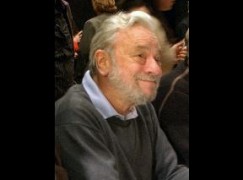
It’s the new book in our Fortnightly Book Club.
Here’s Anthea Kreston:
Welcome to our fourth cycle of the Fortnightly Music Book Club, a club which connects the broad and diverse Slipped Disk audience to great literature as well as gives us a chance to engage with leading musicians of our time. The Fortnightly Music Book Club has a rotating, international group of hosts, and covers a wide range of topics.
I am thrilled to be introducing Bruce Adolphe, composer, author, radio host and lecturer. His music has been performed and commissioned by today’s leading soloists and orchestras, he is resident lecturer at the Chamber Music Society of Lincoln Center, creator/performer of national public radio’s popular podcast Piano Puzzler as well as the author of three books on music. Mr. Adolphe has taught at Yale, The Juilliard School, and New York University. He is an unbelievably warm and engaging person – both on- and off- stage. I first met him as a student at the LaJolla Summerfest, where his teaching and general all-encompassing knowledge was (and continues to be) an inspiration to think deeply, both inside and outside of the box. He will present two books concurrently – one fiction and one non-fiction, available on Amazon and other outlets as kindle or book.
The Mind’s Ear, Bruce Adolphe
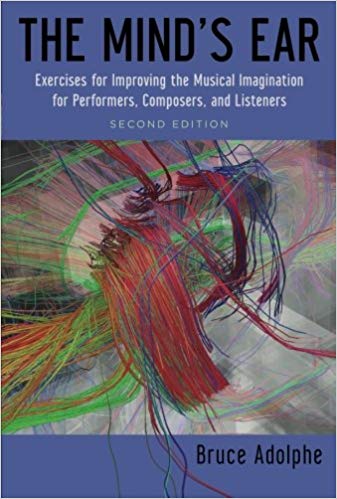
and: Orfeo, Richard Powers
From our guest host, Bruce Adolphe:
Thank you, Anthea, for inviting me to participate in this unique, musical Book Club. I love to read books by living authors and many of my compositions have been inspired by lines from recent novels or nonfiction.
At some point in our lives, we make a decision about what will be our primary focus in life, our profession. We decide to be a pianist, composer, violinist, novelist, actor, lawyer, or neuroscientist. I have always played with the idea of being an actor, and because of my family concert series at Lincoln Center, I have several opportunities per year (for the last 27 years) to go on stage and act a part. I’ve played many roles, including Leopold Mozart, Haydn, Albert Einstein, Maurice Ravel, Beethoven, and my own creation, Inspector Pulse, Private Ear. I have some excellent wigs and hats in my closet at home.
When I was a composition student at Juilliard in the 1970s, I was fascinated by the drama division. Because I wrote incidental music for many of the plays produced at Juilliard while I as a student, I was allowed to sit in on many drama classes and I also attended many more rehearsals of the plays than was required of me as composer for the production. One of my friends in the drama school told me she was jealous of the music students because they could play their instrument when out of work and so still be a musician, but an actor out of work was hanging onto the idea of being an actor by sheer act of imagination and will. They could not go home and just act the way a pianist could play. But I became jealous of the way actors were trained to tap into their memories and imaginations through exercises, to be in touch with their inner lives, to make their emotions available as a matter of technique.
When at the Juilliard Pre-College I had the opportunity to create and teach a new seminar on anything that interested me, I decided to attempt a synthesis of acting classes (games and exercises) and musicianship.The seminar became the basis of my book The Mind’s Ear: Exercises for Improving the Musical Imagination.
The 2013 second edition of The Mind’s Ear, published by Oxford University Press, is much expanded and revised with new exercises and many essays but it retains the essential goal of the original book: to combine the teaching techniques used in music and drama studies in order to directly address the improvement of the musical imagination. And don’t just use your teacher’s fingerings!
_____
ORFEO
Richard Powers’ novel Orfeo is about a retired composer, Peter Els, who returns to his youthful passion for chemistry and in his home microbiology lab tries to compose with life forms, or find musical patterns within bacteria, and ends up a fugitive, fleeing Homeland Security. Through a series of harmless but misunderstood events, Homeland Security comes to believe that Els is a bioterrorist. As the desperate composer flees the law, he relives his past. Quickly made infamous by the Internet as the “Bioterrorist Bach”, Els visits the people he loves and tries to make sense of his life. Being about a composer’s entire life in music from childhood through education to his retirement, the book is filled with musical references, all brilliantly conjured, often in great detail. Among the works that figure significantly in the story are
Steve Reich’s Proverb (a setting of Wittgenstein’s “How small a thought it takes to fill a whole life”), Shostakovich’s Symphony No. 5, Mahler’s Kindertotenlieder (Songs on the Deaths of Children), Peter Lieberson’s Neruda Songs, and Messiaen’s Quartet for the End of Time.
Other composers who are included in the novel in various ways are John Adams, John Cage, Harry Partch, Milton Babbitt, Alexander Zemlinsky, George Rochberg, George Gerswhin, George Crumb, as well as Mozart and many others. Even Machaut and Walter Piston are mentioned. Perhaps even more impressive is Powers’ descriptions of fictional compositions by Peter Els, a rare feat that reveals Powers’ own deep understanding of music.
Here is a list of recommended recordings of music mentioned in the book compiled by Richard Powers:
http://www.richardpowers.net/the-music-of-orfeo/
As a composer, I found it remarkable how vividly and realistically Richard Powers depicts music and a life in music. I have had the good fortune to get to know the author a bit, and we have even worked on a project together. Writing fiction and composing music have a lot in common, and the creative process is always about memory, imagination, selection, refinement, and authenticity.
Bruce Adolphe
As always, questions may be submitted through the comments section or via email to: fortnightlymusicbookclub@gmail.com
See you in a Fortnight!
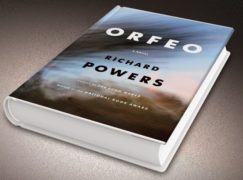
Not the usual online commercial by Finnish Radio:
The diva has been replying to critical comments about her dark skin makeup in the Met’s Aida.
She writes:
anna_netrebko_yusi_tiago@calebjaster I am play Ethiopian princess in antic beautiful production of Aida and wearing exotic markup. Do you have any problem with that? My skin color is likely naturally dark ✌️ production and having
anna_netrebko_yusi_tiago@calebjaster so shut up and stick with your piano and not bother great theater with stupid questions😡
dinah_forsyte@calebjaster Oh, you sweet mediocre thing))) that comment from great artist was the best thing, that happend to you 🤘🤘🤘🤘 Farewell, buddy
Just another late night on social media.
The conductor Rastislav Štúr has been named director of the Slovak National Theatre Opera. He replaces Slavomír Jakubek, who resigned after a negative Culture Ministry audit.
Once considered a cheap rival to Vienna, Bratislava has been in the doldrums for some years.
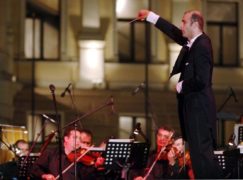
The Greek-born Russian conductor has been named Commander of the Order of the Phoenix, the highest rank of a national honour.
The award was presented by the Greek ambassador in Moscow.
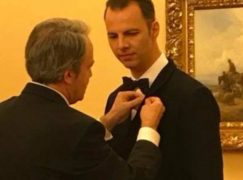
The death has been announced of the American bass-baritone and conductor, Donald Wilkinson.
His colleague Joel Cohen has sent us this appreciation:
How, then, to say goodbye to a collaborator, colleague, and companion of 25 years, someone with whom we made music, sharing good times and bad, season after season, adding up to a full third of man’s biblical lifespan? What appropriate, meaningful words can come forth, even as we struggle with our tears and our grief, to evoke for others essence of Donnie’s kind and tender soul?
He was a man of almost angelic purity. Candid and naïve almost to a fault, held back from the start by problems of education and upbringing, he wanted, despite significant inner handicaps, to go forward towards life and to give his existence meaning. And he did indeed forge a path for himself, realizing his ambition to be a performing artist, and giving enormous pleasure and consolation to countless others via the beauty of his voice. To cite a line from the American songbook, a repertoire that Donnie treasured and recorded, he did it his way. There was a nobility to his existence, and I am humbled as I contemplate, insofar as I perceive it, the arc of his life which sadly ended yesterday.
You heard that round, warm, tender singing voice, onstage and via recording, and reveled in its author’s solid, confident musicianship, in his authentic and appealing personal presence. Did you know, however, that Don’s training was as an electrical engineer, and that he spent years working in a large corporation before deciding that music was his true calling? He told me once that his family had strongly counseled against his career change. Yet he persisted, leaving secure employment, and braving, at the start of his new professional life, genuine hardship and financial stress. He took a big risk, and he succeeded, becoming a property owner in his personal life, and a reliable and welcome part of the Boston-area musical scene.
And none of us, in a field known for its competitiveness and occasional cruelty, ever saw Don, as he rose to widespread acceptance and appreciation, show anything but good will and respect and frequent affection to his colleagues. “He didn’t have a mean bone in his body” is the refrain I have heard echoed from several corners over these last days. He indeed did it his way, but his way, so remarkably, included remaining a gentle soul, always and forever.
And his utterly extraordinary purity of being was unclouded by any trace of pretentiousness, posturing, self-promotion, or self-righteousness.
What you heard from the concert hall stage, as Donnie’s rich baritone rang out, was an affirmation of life and, also, a declaration of love for creation itself. As far as I know, he, though a church musician, was himself unchurched; and so I believe that his singing was the most intense expression of his genuine and authentic spirituality.
We also saw this offering of love, and this search for love, in his other activities and passions. So many of us learned from, and enjoyed, his intense devotion to the world of birds, his forays with binoculars into forests, swamps and marshes — some of us occasionally accompanied him to those places — and, after every tour to every continent, his inevitably long lists, circulated to one and all, of every winged creature he had managed to spot. We were awakened to the world of birds via Don’s enthusiasm, and our sense of awe at the diversity and richness of the universe was increased immeasurably.
He was an enthusiast about the things that were important to him. He also loved nineteen-fifties crooner records, and I Love Lucy memorabilia, and celebrity autographs, and old board games. And Scrabble. And the ocean. And, oh yes, his adored kitties. What an admirable appetite for existence!
I am so sorry for the numerous sorrows he underwent, for his failure to find a lasting, significant other, for the suffering engendered by his final disease. But his existence had meaning; even though it was too short, his was a rich life. He shall continue to live in our hearts for the light, the air, and the beautiful music his time on earth engendered. The angel took risks. He brought goodness into the world. May our friend Donald Wilkinson rest in peace.
Aniane, September 29, 2018
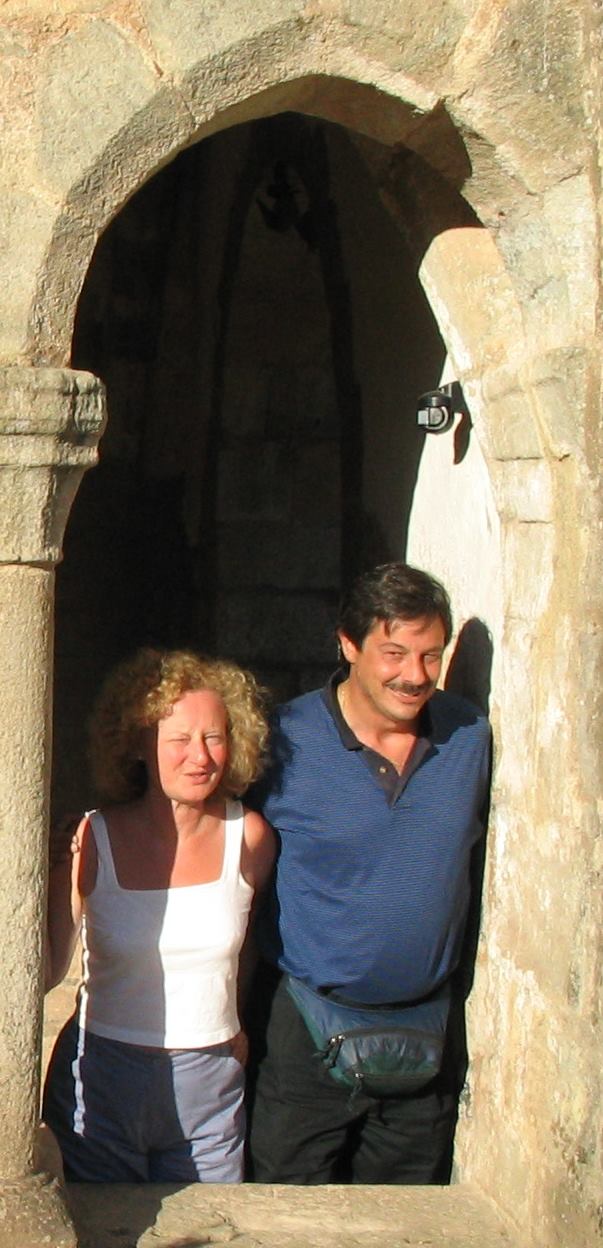
picture: Anne Azema, Donald Wilkinson
Brian Zeger, director of the vocal arts program at the Juilliard School, doubles up as a busy collaborative pianist.
In the first of a new series of Living the Classical Life, Brian talks to Zsolt Bognar about struggles with confidence and making a career.
Watch here.
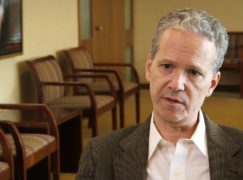
Short clip here: